T-Mobile Home Internet is a relative newcomer to the home internet service market. T-Mobile is aggressively positioning itself with rates as low as $50 per month will all taxes, service fees, and equipment rental included. They are also offering rates as low as $30 per month for subscribers with select T-Mobile cell phone plans.
Spectrum started out back in 1993 as Charter Communications and was rebranded to Spectrum in 2014. They are the second-largest internet service provider after Comcast. They are often cited as one of the most disliked companies in North America. This is largely because they are oftentimes the only option or only viable option in a given region.
| T-Mobile Home Internet | Spectrum | |
|---|---|---|
| Monthly Service Cost | $30 – $50 | $49 – $89 |
| Money Back Guarantee | 30 Days | 30 Days |
| Contracts | No | No |
| Data Caps | No | No |
| Download Speeds | 10 – 400 Mbps | 300 – 1000 Mbps |
| Upload Speeds | 6 – 26 Mbps | 10 – 35 Mbps |
| Latency (Ping) | 45 ms – 90 ms | 25 ms – 30 ms |
| Ping Stability | Poor | Very Good |
| Jitter | 25 ms – 70 ms | 1 ms – 3 ms |
| Type of IP Address Issued | CGNAT / Private IP | Dynamic Public IP |
| Type of Technology | 5G Cellular (Fixed Wireless) | Fiber / DOCSIS 3.1 (Cable) |
| Release Date | 2019 | 1993 as Charter 2014 as Spectrum |
Table of Contents
Primary Differences Between Starlink and Spectrum
- Spectrum Internet Service is generally more expensive.
- Spectrum has much better connection stability.
- Spectrum offers faster download speeds.
- Spectrum home internet has better reliability than T-Mobile Home Internet.
- Spectrum provides you with a publicly routable dynamic IP address.
- T-Mobile Home Internet is priced very competitively, especially for T-Mobile cell phone customers.
- T-Mobile Home Internet is generally not suitable for gaming.
- T-Mobile Home Internet connection stability is poor during peak hours.
- T-Mobile Home Internet provides a CGNAT IP address and a public IPv6 address.
- T-Mobile Home Internet does not support port forwarding or remote access to internal resources.
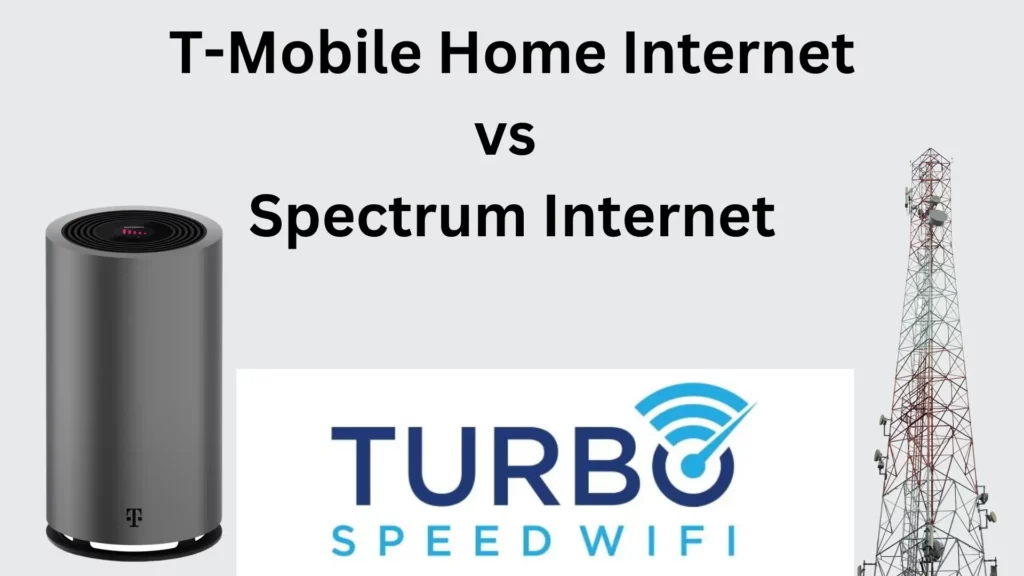
Price
Everyone wants to get a good deal. T-Mobile and Spectrum use very different pricing models. T-Mobile is much more transparent about what your monthly cost will be. Spectrum is your typical ISP with hidden fees and taxes that are buried in the fine print of your agreement.
Both T-Mobile and Spectrum include unlimited data with all of their home internet plans. This is a welcome change in a world of data caps and throttling.
T-Mobile Home Internet Pricing
T-Mobile’s 5G Home Internet plan is one of the most aggressively priced home Internet services on the market. T-Mobile is promising unlimited data for prices that are lower than most other services. One thing to note is that your speed is deprioritized behind that of cell phone users when the cell tower is busy. T-Mobile gives cell phone customers priority over it home internet users.
This is not surprising, given that T-Mobile has a good reputation for increasing competition and driving down prices. Whether you subscribe to T-Mobile or not, you can benefit from the much-needed competition they add to the market.
Currently, you can get T-Mobile Home Internet for $50 per month or for $30 per month with select T-Mobile Cell Phone Plans. The prices you see include all taxes and fees. It also includes the rental of your T-Mobile 5G Home Internet Gateway. T-Mobile is 100% transparent about what you pay, with no hidden fees or price increases. There are also no contracts. This is sharply in contrast to what many other ISPs offer.
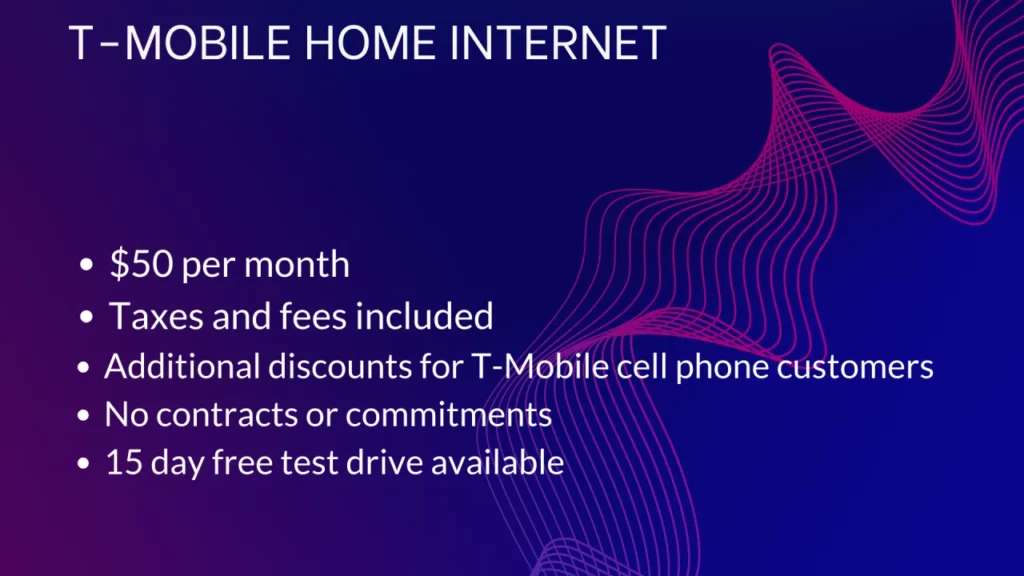
Spectrum Internet Pricing
Spectrum Internet Service generally costs between $50 – $90 per month, depending on which plan you choose to subscribe to. As with most service providers, the faster plans tend to cost more per month. Unlike T-Mobile, Spectrum offers promotions where you can often get a lower price for the first 6 – 12 months of service. This is pretty common in the home internet service industry.
Spectrum includes a basic modem at no additional monthly cost with all plans. Unlike Xfinity and other providers that charge up to $15 per month for a modem rental, Spectrum includes a modem in your monthly cost of its internet plans.
One thing to note is that the free modem with Spectrum does not provide WiFi. You will need to use your own router. Using your own router is best anyways, but it is something to be aware of. If you do want to get your WiFi router from Spectrum, that will cost you an extra $5 per month.
| T-Mobile Home Internet | Spectrum Gigabit | Spectrum 300 Mbps | |
| Cost Per Month | $30 – $50 | $89 | $49 |
| Upfront Cost | $0 | $0 | $0 |
T-Mobile Home Internet is generally less expensive than Spectrum Internet. If you are looking for the absolute lowest price, T-Mobile is your winner. They also offer simpler to understand pricing and do not use promotions or other discounts that expire in 6 – 12 months.
Price Winner: T-Mobile Home Internet
Availability
T-Mobile Home Internet and Spectrum Internet are both available to millions of subscribers across the United States. Coverage regions will vary, and depending on your service address, you may or may not have access to one or both of these ISPs.
Spectrum currently provides cable TV and internet services in select areas of 41 US states. Spectrum is largely comprised of areas that were formerly serviced by Time Warner Cable and Charter Communications. Check the coverage map to see if Spectrum is available at your service address.
T-Mobile Home Internet is also widely available in the United States. They offer service in select regions of 49 states. They also tend to serve rural areas more comprehensively than Spectrum and other traditional ISPs do.
Cell phone tower capacity is actually one of the primary limiting factors for T-Mobile Home Internet. T-Mobile will only sell its home internet service to people living in areas where they have enough cell tower capacity to support it. This is essential as T-Mobile does not want to negatively impact its core user base of cell phone users. Click to see if T-Mobile Home Internet is available at your service address.
Availability Winner: T-Mobile Home Internet
Speed
Speed is an important factor when choosing which internet service provider to go with. Everyone wants fast internet. However, many people have different ideas of what they consider to be “fast.”
Based on my own personal experience as well as data from my colleagues, Spectrum offers faster speeds than T-Mobile Home Internet.
Spectrum Internet Speeds
Spectrum offers internet plans with download speeds ranging from 300 Mbps to 1 Gbps. Upload speeds are much lower, with speeds of 10 Mbps to 35 Mbps depending on the plan.
My own hands-on testing with Spectrum Internet has shown that Spectrum is able to pretty consistently deliver the advertised speed or better. For most people looking for fast internet, Spectrum will be a great option.
Based on my testing, Spectrum gigabit internet was generally able to max out the limitations of a gigabit ethernet port at about 950 Mbps. During peak hours, sometimes I would see download speeds dip a little to around 900 Mbps, but never any lower.
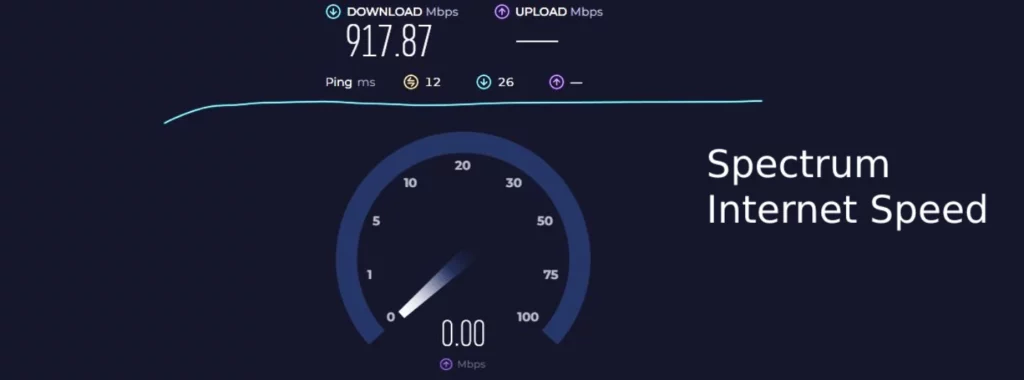
Upload speeds were also impressive with Spectrum and generally came in at between 100% and 105% of advertised numbers. Though I would like to see Spectrum offer faster upload speeds in general, it was good to see them actually exceed the advertised numbers.
T-Mobile Home Internet Speeds
T-Mobile Home Internet only offers a single tier of service. They do not offer multiple speed tiers to choose from. They are also less specific about the kind of speeds you can expect to get. They describe their download speeds with the following verbiage.
“T-Mobile 5G Home Internet customers see typical download speeds between 33-182 Mbps, which is great speed for streaming video, surfing the web, working from home and most types of online gaming. Speeds can vary depending on location, signal strength and availability, time of day, and other factors.”
In my own testing, most of the time, I saw speeds between 20 Mbps and 75 Mbps with T-Mobile Home Internet. I never got more than 95 Mbps at any point with T-Mobile Home Internet. During peak hours, download speeds of 20 Mbps – 45 Mbps were the most common.
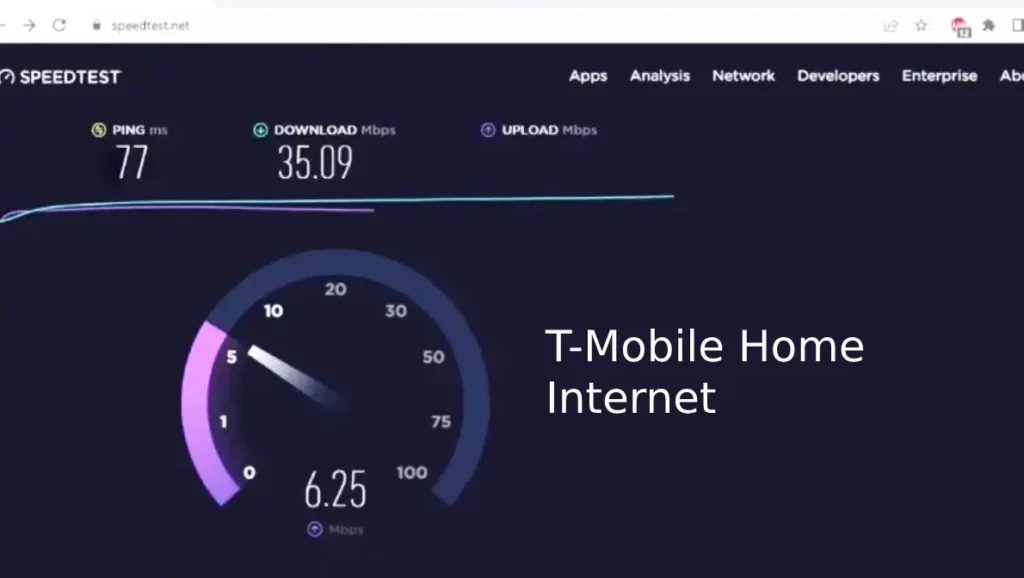
Upload speeds with T-Mobile Home Internet are not as widely published. However, on T-mobile’s official website, I found in the FAQ section that upload speeds of 6 Mbps – 23 Mbps are typical when connected via 5G.
In my testing, speeds of 5 Mbps – 10 Mbps were typical. The highest upload speed I saw with T-Mobile Home Internet was 13 Mbps. During peak hours, 5 Mbps was typical, and sometimes I saw upload speeds of 2 Mbps or less. This is significantly less than what you get with Spectrum Internet.
| T-Mobile Home Internet | Spectrum Internet | |
| Average Download Speeds (Peak Hours) | 30 Mbps | 923 Mbps |
| Average Download Speeds (Off Peak Hours) | 62 Mbps | 947 Mbps |
| Average Upload Speeds (Peak Hours) | 5 Mbps | 36 Mbps |
| Average Upload Speeds (Off Peak Hours) | 8 Mbps | 36 Mbps |
Speed Winner: Spectrum
Latency, Jitter, and Stability
Spectrum Internet performed well in my stability testing. Latency was low but know quite as low as with Xfinity and some other cable-based providers. Generally, with Spectrum, I was seeing pings of between 30 ms and 40 ms. This is not bad, but it is not as low as with some providers. The routing used by Spectrum appears to be less direct in many cases. This leads to slightly higher latency.
Consistency is also excellent with Spectrum Internet. Rarely would I see a spike of 55 ms or less. I did not have any issues with online gaming or videoconferencing via Zoom.
For people who work from home or play online games, Spectrum is a solid choice. I found no real issues related to latency, ping, jitter, or stability.
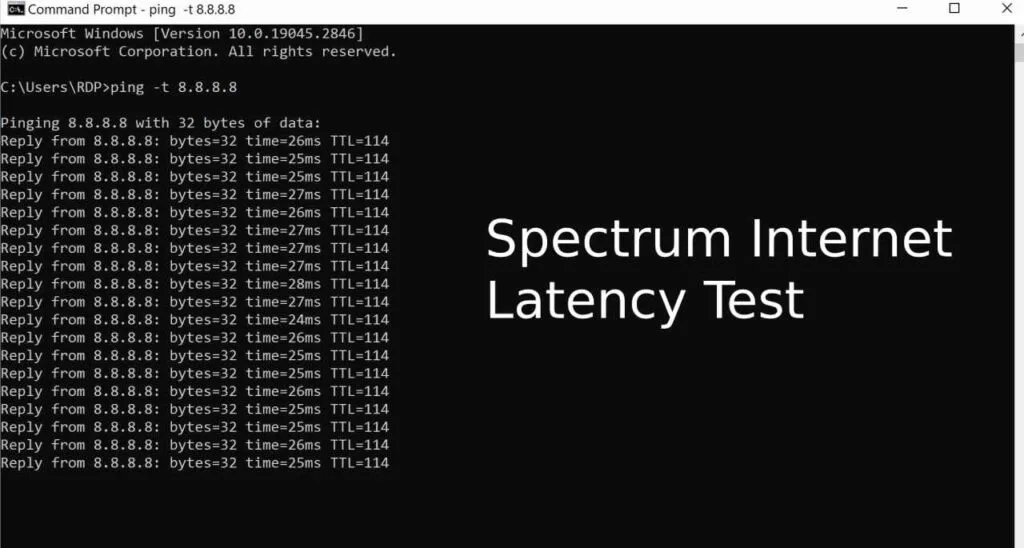
T-Mobile Home Internet did not perform that well when it came to stability and latency. During off-peak hours when the cell tower was not congested, latency was sometimes acceptable. I saw pings in the 55 – 65 ms range. This is likely okay for most people, but it is far from the ultra-low latency that 5G was supposed to bring to the world.
The problem that I ran into is the latency varies greatly from hour to hour with T-Mobile Home Internet. During peak hours, when you probably use the internet the most, T-Mobile Home Internet performs at its worst. Over the course of several minutes, latency will vary all the way from 50 ms all the way up to 500+ ms.
Based on my testing, T-Mobile Home Internet is completely unusable for online gaming, video conferencing, and other latency-sensitive applications during peak hours. If you plan to game or need to work from home, avoid T-Mobile Internet. It is unlikely to meet your needs.
T-Mobile Home Internet vs Spectrum Internet Ping and Jitter
| T-Mobile Home Internet | Spectrum Internet | |
| Average Ping (Peak Hours) | 200 ms | 32 ms |
| Average Ping (Off Peak Hours) | 50 ms | 32 ms |
| Average Jitter (Peak Hours) | 70 ms | 3 ms |
| Average Jitter (Off Peak Hours) | 20 ms | 2 ms |
Latency, Jitter, and Stability Winner: Spectrum
Online Gaming Performance
According to their respective brands, Spectrum and T-Mobile Home Internet are both described as being “good for gaming.” In the past, I found that Verizon 5G Home Internet worked relatively poorly for gaming. I was interested to see if T-Mobile Home Internet would do any better.
On multiple nights I played competitive games, including Call of Duty, Fortnite, and Halo. I tested performance on PS5, Xbox Series X, and on PC via Steam. The performance was a bit of a letdown for me.
Latency was all over the place, and I was lagging in most multiplayer matches. Call of Duty was completely unplayable on T-Mobile Home Internet. I would have expected better from an internet service marketed as being good for gaming.
The other issue with T-Mobile Home Internet that impacted my ability to play games was my NAT Type. It was strict, and I was unable to successfully change my NAT Type to even moderate. On Xbox Series X, I kept getting the Double NAT Detected warning. This, however, did not surprise me, as I knew that T-Mobile used CGNAT and that this would likely be an issue.
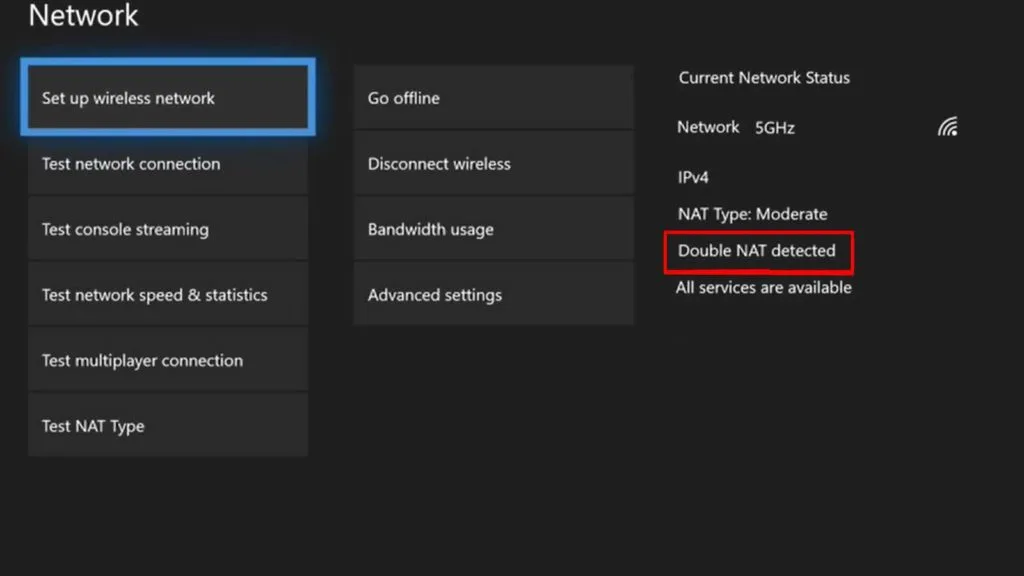
Spectrum proved to be a solid choice for gamers looking for smooth performance and good stability. I did not have any issues joining multiplayer matches, as my NAT Type was Moderate. With some basic port forwarding, I was able to get an Open NAT Type with ease.
Latency was generally pretty low and rarely went above 50 ms, even during peak hours. Fortnite and Call of Duty both perform well on Spectrum. I was averaging a ping of around 40 ms to most opponents. This felt smooth despite being slightly higher than with Xfinity and some other providers.
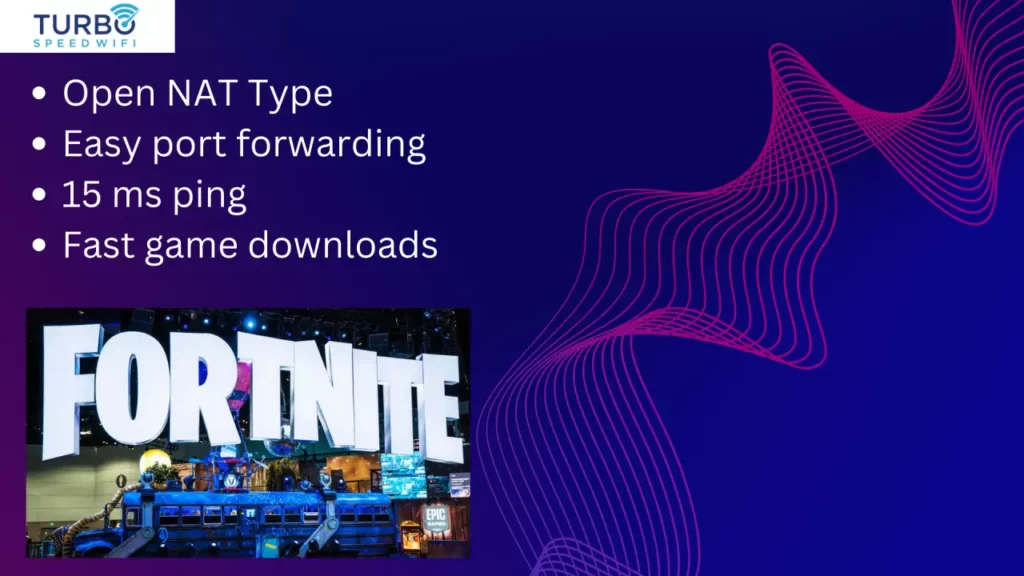
For online gamers, Spectrum is going to be a much better option than T-Mobile Home Internet. Based on my testing, there was a huge gap in performance between T-Mobile and Spectrum for gaming. Gaming on T-Mobile Home is generally not a great experience. Learn more about gaming on 5G home internet.
Online Gaming Winner: Spectrum
Reliability
I did not have any reliability issues with Spectrum during my testing, and I had minimal issues with T-Mobile. Both services are reliable enough for most home internet users. Overall reliability was good with both services. However, consistency is an issue with T-Mobile Home Internet.
On several occasions, I found that T-Mobile Home Internet has such high packet loss that it was essentially not usable.
For this reason, I would hesitate to recommend T-Mobile Home Internet to anyone who needs an absolutely rock-solid internet connection. You would not want to be on a Zoom call with your boss and have this happen to you. Spectrum is much more consistently reliable than T-Mobile Home Internet.
Reliability Winner: Spectrum
Customer Service and Tech Support
Telecommunications companies, including ISPs and cell phone carriers, are notorious for offering bad customer support.
I had several interactions with customer service from both Spectrum and T-Mobile, and I would say that T-Mobile offered a better support experience.
The T-Mobile reps I spoke with were all friendly and easy to understand. They were able to answer most of my questions with relative ease. I was relatively impressed by the fact that the longest I was put on hold was about 5 minutes. T-Mobile tech support was less than great but was good at explaining most things in an easy-to-understand way.
The billing department support was also helpful and made it super easy to cancel my service at the end of the 30 days. I was impressed at how few hoops I had to jump through to cancel my T-Mobile Home Internet service.
Support with Spectrum was painfully slow. On several occasions, it took more than 2 hours to get through to a support rep. Spectrum also made it extremely difficult to get a replacement modem sent after the provided modem stopped powering on at all.
Billing support was also bad with Spectrum. The queue was fast to get through, but the customer service reps were not particularly helpful. When I went to cancel my service, they kept transferring my call, and the entire process of canceling took well over an hour.
I was not overly impressed at the support I received from Spectrum. Support is definitely one of the most criticized aspects of Spectrum, and I can see why. It leaves much to be desired.
Customer Service and Tech Support Winner: T-Mobile Home Internet
Overall Ratings
Based on my objective rating system Spectrum is the better home internet service. However, there were definitely pros and cons to both services.
Depending on what is most important to you, T-Mobile Home Internet might be a great choice for you. There are also other internet services that you should consider.
| Spectrum Internet | T-Mobile Home Internet | |
| Price | 7/10 | 9/10 |
| Speed | 9/10 | 5/10 |
| Stability | 8/10 | 2/10 |
| Latency | 8/10 | 3/10 |
| Gaming Performance | 7/10 | 4/10 |
| Zoom Call Performance | 8/10 | 5/10 |
| Reliability | 8/10 | 6/10 |
| Availability | 5/10 | 7/10 |
| Customer Service | 3/10 | 4/10 |
| Ease of Canceling Service | 4/10 | 7/10 |
| Overall Score | 67/100 | 52/100 |
T-Mobile Home Internet: Overall Score 52/100
Spectrum Internet: Overall Score 67/100
Overall Winner: Spectrum Internet
Alternatives to Starlink and Spectrum to Consider
There are several other internet service providers (ISPs) that, based on my experience and first-hand testing, are also worth checking out. These services tend to offer a good balance of price to performance and are available in many regions across the United States.
- Verizon Fios
- Xfinity Internet
- AT&T Fiber Internet
- Fidium Fiber Internet
- Breezeline Internet
Many of these services offer faster speeds than what is available with Spectrum and also cost less per month. When compared to T-Mobile Home Internet, these services tend to offer much better performance, reliability, and stability.
Who is T-Mobile Home Internet Best For
The following list is a helpful way of deciding if T-Mobile Home Internet might be a good option for you. Consider T-Mobile Home Internet if:
- Your internet needs are modest.
- You are an existing T-Mobile customer.
- You are not a gamer.
- You do not work from home.
- You do not care about using your own router.
- Saving money on your internet bill is your top priority.
- You are a cord-cutter.
If transparency of pricing and ease of canceling is most important to you, T-Mobile Home Internet is likely the better option for you. Pricing with Spectrum is more difficult to understand, and they hit you with various taxes and fees. Spectrum also uses promotional pricing, which means that your price increase in 6 – 12 months.
T-Mobile Home Internet is also ideal for qualifying T-Mobile cell phone customers who are eligible to get the home internet service at an even lower price of $30 per month.
I would not recommend T-Mobile Home Internet for people who work from home and need a rock-solid connection to the Internet. I would also not recommend it to gamers. For everyone else, it is an option worth looking at if saving money on your internet bill is important to you.
I would also not recommend T-Mobile Home Internet to people who are going to subscribe to Spectrum for TV. The bundle pricing offered by Spectrum is going to be a better value than getting your TV from Spectrum and your internet from T-Mobile.
Who is Spectrum Best For
Spectrum Internet is a better choice for people who need a fast and stable connection to the Internet. In my testing, Spectrum was much better at delivering consistent performance that you can count on.
The following list is a helpful way of deciding if Spectrum Internet might be a good option for you. Consider Spectrum if:
- You need a consistent and reliable connection to the internet.
- You are a gamer.
- You work from home or run a business from home.
- You want to use port forwarding functions on your router.
- You want consistently fast download speeds.
- You intend to use Spectrum TV.
Spectrum Internet is likely a much better option for you than T-Mobile Home Internet if you care about having fast internet that is also stable and reliable. Spectrum is also a better choice for online gamers who want a stable, low-latency connection to the internet.
For people that work from home or run a business from home and use applications such as Zoom, Microsoft Teams, Webex, or other online meeting and VoIP programs, Spectrum is a good choice.
For Spectrum TV subscribers, bundle pricing makes Spectrum Internet almost a no-brainer decision. The bundle pricing is significantly cheaper than what Spectrum TV and Internet purchased separately cost.
Conclusion: Spectrum vs T-Mobile Internet
T-Mobile Home Internet is a relative newcomer to the home internet scene. They are doing everyone a favor by increasing competition and shaking up an industry that is ripe for disruption. Their pricing is truly outstanding, and it is causing major shifts in the entire industry.
Spectrum is your typical love-to-hate cable company. They partake in practices that are anti-consumer, including charging hidden fees and using some shady pricing tactics. However, Spectrum has several compelling reasons that you may want to consider them over T-Mobile Home Internet.
Spectrum wins out in key areas, including download and upload speeds, latency, stability, and reliability. For these reasons, I would recommend Spectrum over T-Mobile Home Internet for most people.
You may also want to consider Spectrum Mobile, which is highly cost-competitive with other mobile virtual network operators (MVNOs). Spectrum allows you to bundle your cell phone service with your own internet service for even bigger savings.
Overall, Spectrum is providing better internet than T-Mobile, but both services are improving every year. In the future, we may see things flipped the other way. Only time will tell.

RighteouslyIndignant100
Saturday 9th of September 2023
Where I live Spectrum rarely peaks above 120Mbps and calls to Spectrum give no hope of exceeding that. Since the real (rural) world is limited, giving advise like this is of no use. T-mobile gives me 3bars on my phone. I would suggest that, since both give you 30 days to decide, people actually try them both, comparing the "300Mbps" spectrum service with the T-mobile service. A survey of people like that would be useful.
RighteouslyIndignant100
Tuesday 12th of September 2023
@Zachary Harper,
So you are suggesting that the higher speed plans that Spectrum sells are a waste of money
Zachary Harper
Monday 11th of September 2023
Trying multiple options is never a bad thing. However, to be fair 120 Mbps is more than anyone needs to stream 4K, play online games, download large files, etc. Even if T-Mobile was faster some of the time, what really matters is the consistency and reliability. Generally cable based internet is going to dominate 5G home internet in these areas.